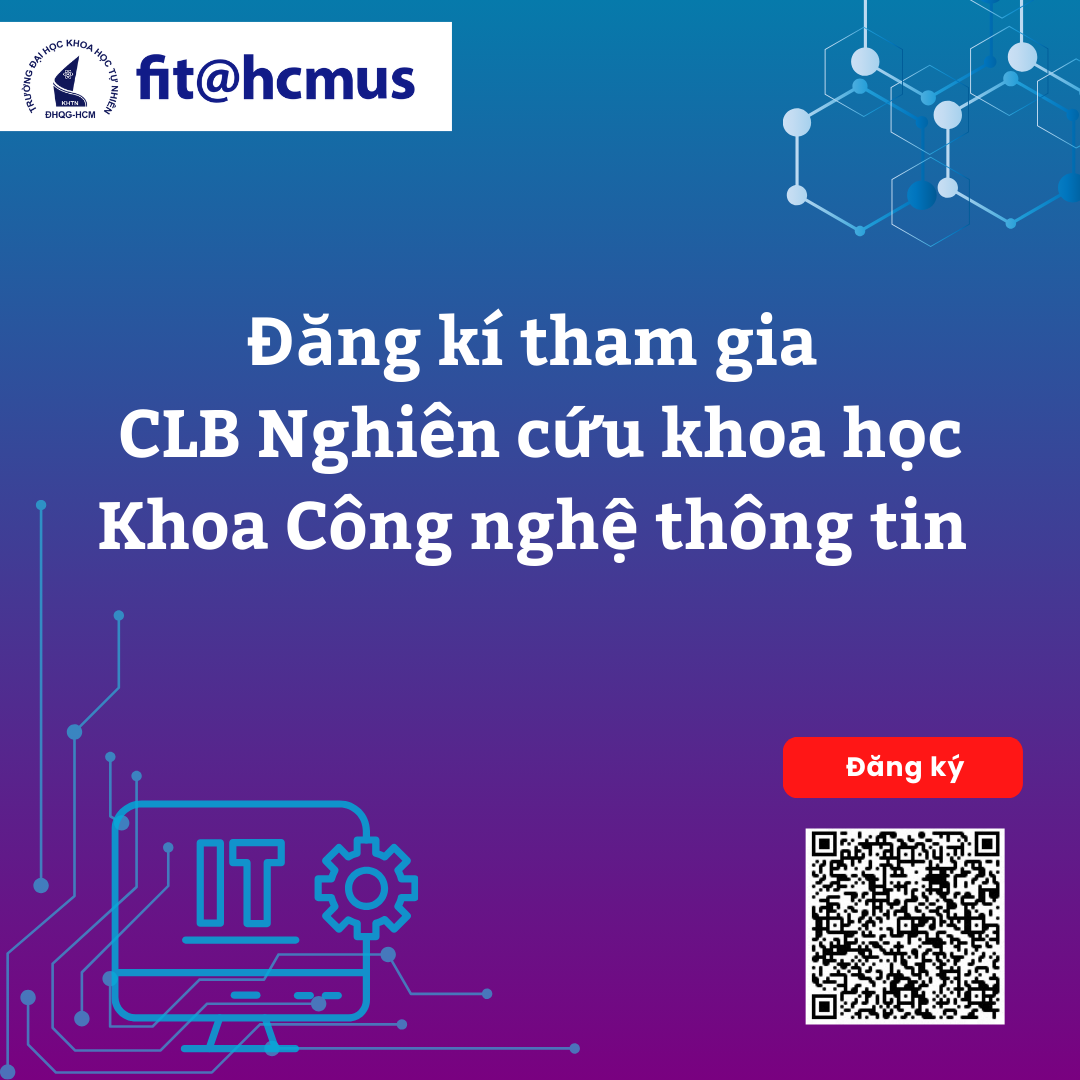Introduction
The Scientific Research Club was established as a space to connect various research groups and directions within the Faculty of Information Technology, University of Science. Each group is guided and supported by experienced faculty members specializing in the respective research areas. The club serves as a hub where students, researchers, and lecturers - both from within and outside the Faculty - can explore research directions, exchange academic knowledge, develop new ideas, and carry out research projects.
The Faculty encourages regular interaction and collaboration among groups to broaden perspectives, strengthen scientific knowledge, and work toward tackling complex, interdisciplinary research topics.
For students, the Scientific Research Club is a destination for those passionate about research upon entering the Faculty. Members may join research groups that align with their personal interests and career orientation. To maintain membership benefits and support, students are required to participate in at least one club activity per month.
Club Activities
The club organizes weekly seminars for each thematic group (listed below). In addition, a monthly joint seminar is held, where groups present their most notable topics. Seminar content may cover a scientific field, a new research direction, or an ongoing, completed, or upcoming research project. The club also invites industry partners to participate as speakers or guests, fostering stronger connections and expanding opportunities for research–industry collaboration.
Club Steering Committee
- Assoc.Prof. Nguyen Van Vu
- Assoc.Prof. Le Nguyen Hoai Nam
- Dr. Nguyen Ngoc Thao
- Dr. Le Khanh Duy
- Dr. Truong Toan Thinh
Club Registration
The Faculty of Information Technology Research Club invites undergraduate and graduate students to register at the provided link, choosing to join either as an Observer or a Member.
- Observer: For those interested in research but not yet certain about pursuing it long-term. Observers commit to attending at least one seminar per month.
- Member: For those eager to actively engage in scientific research. Members are expected to participate in seminars on a regular basis.
✔ Conditions and Requirements for Participation:
- A genuine interest and curiosity in scientific research.
- Regular attendance at group meetings within the chosen research area(s).
- Attendance at a minimum of one club seminar per month.
- Active participation in research projects or groups (when possible).
- Sharing and presenting individual or group research outcomes once notable results are achieved.
✔ If you need further information, please respond via email: data@fit.hcmus.edu.vn
Research Directions
The club currently focuses on the following main research areas:
1. Artificial Intelligence in Software Engineering (Intelligent Software Engineering)
Advisor: Assoc. Prof. Dr. Nguyễn Văn Vũ
This direction explores the application of artificial intelligence to software engineering problems, aiming to develop solutions that support and automate software development. Specific topics include: source code generation, bug detection and fixing, automated testing, requirement generation and evaluation, software debugging, computer-using agents for automating user tasks, project management, and cost estimation.
Skills students can develop: machine learning, AI agent development, large language model (LLM) applications, research skills, and scientific publishing.
2. Computational Theory (Fundamental Computing)
Advisor: Dr. Bùi Văn Thạch
This direction focuses on building and developing algorithms and applying them to a wide range of domains, including graph theory, statistics, biomedical studies, cryptography, and machine learning/AI.
Research topics include: blockchain, sparse signal recovery, statistical learning, graph theory, recommender systems, and e-commerce.
3. Human–Computer Interaction and User Experience (HCI–UX & Applied AI)
Advisors: Dr. Lê Khánh Duy, Dr. Lê Trung Nghĩa
This research direction focuses on integrating modern technologies (AR, VR, MR combined with AI) with user-centered design to create new interaction methods that enhance both performance and user experience.
Research topics include: AR, VR, MR, collaborative systems, human–AI interaction, interactive systems for learning and training, generative AI and its applications.
Skills students can develop: AR/VR/MR programming (Unity), game development, interaction and UX design, software system development, GenAI applications, and research and scientific writing.
4. Natural Language Processing (NLP)
Advisors: Assoc. Prof. Dr. Đinh Điền, Dr. Nguyễn Hồng Bửu Long, Dr. Ngô Minh Nhựt, Dr. Nguyễn Trường Sơn, Dr. Châu Thành Đức
The group focuses on natural language processing, with a strong emphasis on the Vietnamese language. Main research areas include text processing (translation, summarization, search, difficulty analysis, similarity, and style), speech processing (recognition, synthesis, transformation, comparison), and multimodal approaches such as image-based question answering using natural language.
The group also develops chatbots for education, healthcare, public administration, and enterprise applications. In addition, it contributes to heritage preservation through automated processing of Hán–Nôm texts (OCR, phonetic and semantic translation, data querying). Further work involves applying AI, LLMs, and Knowledge Graphs (KG) to Vietnamese historical analysis, advancing the interdisciplinary field of Computational History.
Skills students can develop: machine learning, deep learning, LLMs, chatbot development, NLP/LLM applications for enterprises, and scientific research and writing.
5. Information Security and Processing
Advisors: Dr. Trương Toàn Thịnh, Dr. Nguyễn Ngọc Thảo, Assoc. Prof. Dr. Lê Nguyễn Hoài Nam
This research direction focuses on developing and applying advanced methods to address critical challenges in information security and data processing. The group aims to ensure information safety and cybersecurity by designing defensive techniques against risks, attacks, and security breaches. At the same time, it emphasizes the development of models, algorithms, and tools to process, analyze, and optimize data use in real-world contexts. Artificial intelligence and machine learning are also integrated to enhance big data processing, anomaly detection, and intelligent, efficient decision-making.
6. Multi-modal Learning
Advisors: Dr. Nguyễn Tiến Huy, Dr. Lê Thanh Tùng
This direction centers on multi-modal artificial intelligence, natural language processing, and their practical applications. The group focuses on developing large language models for Vietnamese, research on Visual Question Answering (VQA), recommender systems, dataset construction, and algorithm optimization. With numerous international publications and prestigious funded projects, the AI-Thena group aims to become a pioneer in localized AI development, contributing to both academic research and real-world applications in communities, enterprises, and healthcare in Vietnam.
Research topics include: multimodal AI understanding and reasoning, large language models (LLMs), applied machine learning and deep learning, and AI solutions for real-world demands.
Student skill development: Students gain both technical and research expertise. Technically, they acquire foundations and hands-on skills in AI, machine learning, deep learning, LLMs, multimodal AI, data processing, pipeline building, and model training and evaluation. In research, they practice reading and synthesizing international literature, designing experiments, analyzing results, writing scientific papers, and presenting and defending ideas before committees.
7. Computer Vision
Advisor: Dr. Võ Hoài Việt
This research direction focuses on the core areas of computer vision, including building theoretical foundations of digital imaging, developing modern and efficient models, and deploying applications on edge devices (IoT).
Highlighted topics include: human behavior analysis in video using optimized computational models, high-performance creative applications with LMMs, explainable AI (xAI) for general and medical image understanding, plant disease detection from images, and automated labeling of real estate images in Vietnam.
Student skill development: Students will build a solid theoretical foundation in digital imaging and computer vision, sharpen problem-solving through scientific research, and gain experience with advanced methods such as deep learning, multimodal learning, and xAI. They will also develop hands-on expertise in deploying systems across platforms ranging from personal computers and cloud computing to IoT devices.


